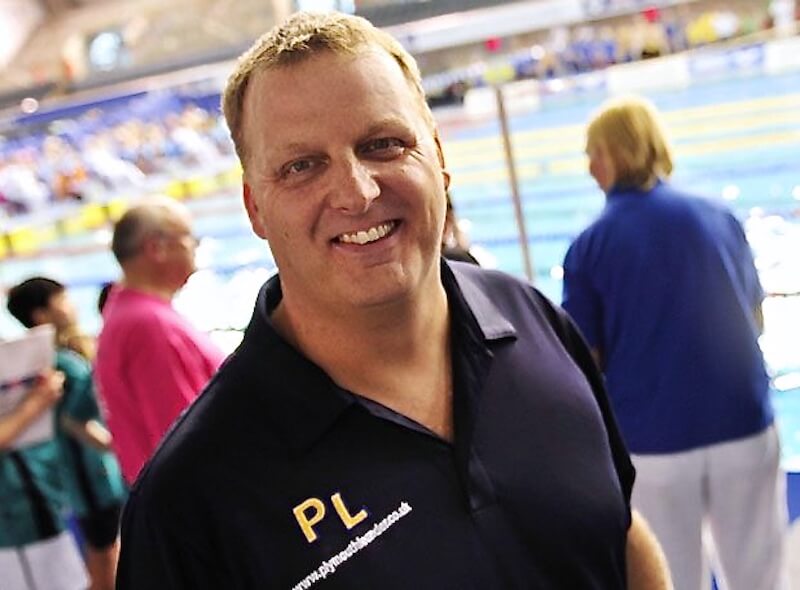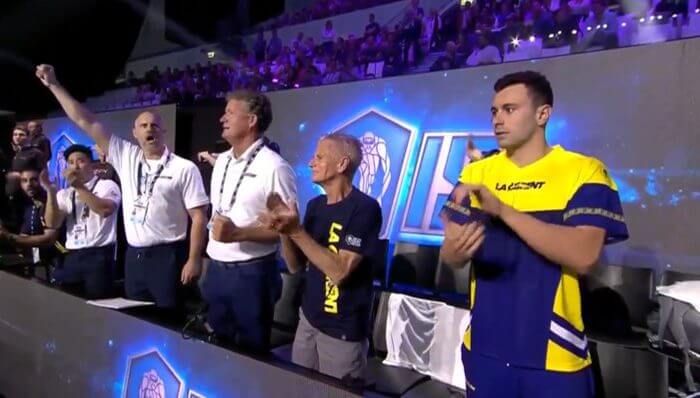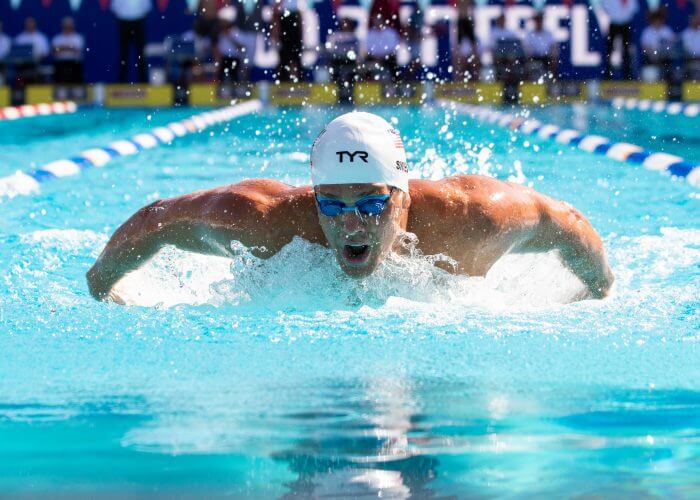2020s Vision – Athlete Voice Needs Coach Voice Of Experience, Reason, Objectivity, Says Rudd

The Athlete Voice has become louder and more effective in forcing change in sports governance of late. It has the likes of Matt Biondi and Adam Peaty as its champion. But what of the Coach Voice? Has it been drowned out by the noise of athletes on the rise? Would swimming not be better off hearing the coaches whose experience and longevity offers a different perspective?
As part of our 2020s Vision series, Swimming World’s European Correspondent Liz Byrnes caught up with Jon Rudd, a coach leader at the forefront of moves to establish WSCA (Europe) as the representative home of the continent’s swim coaches. Says Rudd:
“The coaches are the ones with the experience and formal education and knowledge in swimming and how swimming can and should progress and athletes are around for a relatively short space of time but coaches are often around for several generations of athletes.
“So I don’t think it’s to try and stifle the athletes’ voice at all – that’s desperately not what we want – it’s to ensure the voice of experience, reason and quite often objectivity and why someone might be saying a particular thing is heard by officials, by committees, by boards – at the governance level of the sport.”
2020s Vision – As Athlete Voice Grows Stronger, Will Coaches be Heard, Too?
Jon Rudd wants to ensure the voice of experience is heard after the European branch of the World Swimming Coaches Association was formed in Glasgow last month.
Rudd, who coached Lithuanian Ruta Meilutyte at Plymouth Leander in England to Olympic 100m breaststroke gold in 2012 and is now head of performance at Swim Ireland, is a driving force behind the development of WSCA (Europe), part of a plan to create branches across the world.
Forty coaches attended a meeting during the European Short-Course Championships where they were presented with a draft constitution aligned with that of the full body. The draft was adopted as read, allowing a board to be appointed.
There will be a further meeting at the European Championships in Budapest in May, when coaches will have the opportunity to give feedback on the constitution and the work can begin on delivering what coaches want and need from the organisation.

The L.A. Current Coaches Bench at work: from left, Brett Hawke, David Marsh and Jack Roach watch Andrew Seliskar win the 400 IM for the L.A. Current.
Rudd had been uncertain how many would attend the meeting in Glasgow but believes the 40-strong attendance was indicative of a desire by coaches to have representation, leadership and support.
Recalling the meeting, Rudd told Swimming World: “So, is there an appetite for this? By implication that you are in the room, there is. Here is a list the world body believes a branch of the association could deliver for you which included education, representation, support.
“We talk a lot these days – and quite rightly so – around mental health and emotional health and it is something coaches have to deal with and where is the support and guidance and help on those kind of issues? We had a big list of all of these things. And so – you want to do this? Good, here is a constitution that allows us to get started, shall we adopt it? Yes, right, the constitution now informs us how we actually formally construct and now we shall formally construct.”
Rudd has been the European representative on the WSCA Board for three years and believes it is imperative that each region has its own voice that can articulate its particular issues and needs.
Specific, Meaningful, Quality Representation
He said: “Each time I go to the annual board meeting – one where we sit together – and each time I meet with colleagues I say to them for this association to truly represent coaches as you want to do on a worldwide scale we have to get you out of America because the majority of the instigators and the drivers of the association are from the US.
“So it’s very difficult for them to understand and know what European issues are, what Asian issues are, what African issues are. Also when I go as a European representative I’m not actually taking a European voice with me, I am giving them Jon Rudd’s opinion on what Europe want which might not be the case, might not be true.
“I have got my ear to the ground and I’ve got an idea where we want the sport to progress but I am not actually being given a true directive by European coaches on the coalface saying these are the things we need addressing with FINA and we want WSCA to act on our behalf.”
Hence the need for a channel through which those coaches can make themselves heard.
“There should be a true communication and a track from the world body through to the continental body through to the national coaches association assuming one exists because there isn’t one in every nation and to the coaches themselves,” said Rudd.
“So the coach has a voice right through, whereas at this moment in time the coach either has a voice to their national association or they don’t have a voice at all because their national association doesn’t exist.
“Or they happen to be a member of WSCA kind of by accident but there is no real way they can say I need some support, guidance, advice please – that’s the idea.”
The Athlete Voices Leading The Charge

Tom Shields – Photo Courtesy: Connor Trimble
Dissenting voices have been growing louder among swimmers over the past 18 months or more.
Olympic 100m breaststroke champion Adam Peaty challenged FINA to ban him after he backed the International Swimming League in December 2018.
That came months after Katinka Hosszu, Michael Andrew and Tom Shields launched a lawsuit against the world governing body following the cancellation of the Energy For Swim meet due to be held in December of that year.
While Rudd supports the rise in the athletes’ voice, he questions whether that may drown out the coaches whose experience and longevity offers a different layer.
He said: “The bottom line is we are in the sport for the athletes – or we certainly should be.
“So the athlete voice does need to be strong and it does need to be heard and they should have a right to give opinion on their sport and the reason we are all in the sport.
“But perhaps a knock-on effect of the rising athlete voice is not the reduction in the coaches’ voice but does that become stifled and muffled? The coaches are the ones with the experience and formal education and knowledge in swimming and how swimming can and should progress and athletes are around for a relatively short space of time but coaches are often around for several generations of athletes.
“So I don’t think it’s to try and stifle the athletes’ voice at all – that’s desperately not what we want – it’s to ensure the voice of experience, reason and quite often objectivity and why someone might be saying a particular thing is heard by officials, by committees, by boards – at the governance level of the sport.”
The meeting came 10 years after European coaches united under the WSCA banner and led protests against the shiny suits on the pool deck at the European Short-Course Championships in Rijeka, Croatia.
As written elsewhere in Swimming World, the group did not last, with sources talking of those who feared consequences. (see From the Archive below).
Rudd knows that there is always a compromise for the coach between wanting to make the strongest representation and for some not wanting to rock the boat because it is not seen as the right thing to do by their employers or national governing body.
However, he points to the power of a collective, saying: “There is no doubt that when coaches act collectively and are passionate about an issue – particularly about something that is undermining our sport or taking our sport backwards as the rubber suits did – that when they do this they are listened to.
“But there needs to be a vehicle by which coaches can do that and can have that voice rather than waiting until a meet that everyone starts getting so upset they start crowding round an officials table and demanding things. This can be done in a much more practical and sensible and in a manner that would seem to be professional and respectable at the same time.”
In this first quarter of the new decade and 2020, we will consider the following themes:
- The Athlete Voice
- Swimming Culture – what is it?
- Gender Vs Sex: a waking nightmare for women’s sport?
The Athlete Voice:
- Matt Biondi’s Mission To Enrich & Educate Swimmers
- ‘Alliance’ Not ‘Union’ Aims To Take ISL Model To Multi-Sports ‘Games Of Magic’
Do you have a contribution to make, a topic to suggest within the frame of the themes we are looking at this quarter? Your views on any theme can be left in the comments field at the foot of any article, while those who want to reach out with suggestions to the editorial team can contact us at editorial@swimmingworld.com.



